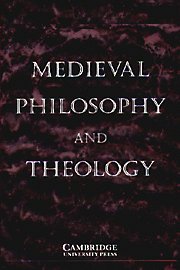No CrossRef data available.
Article contents
Species, Concept, and Thing: Theories of Signification in the Second Half of the Thirteenth Century
Published online by Cambridge University Press: 30 July 2001
Abstract
Students of later medieval semantics are familiar with the controversy that developed at the end of the thirteenth century over the signification of names. The debate focused on the signification of common nouns such as ‘man’ and ‘animal’: Do they signify an extramental thing or a mental representation of an extramental thing?Some authors at the end of the thirteenth century also discussed another question concerning what names signify, that is, whether they signify the composite of matter and form or only the form of the composite. This second debate will not be considered in this article. Duns Scotus is commonly recognized as having played an important role in this debate.See Costantino Marmo, “Ontology and Semantics in the Logic of Duns Scotus,” in Umberto Eco and Costantino Marmo, ed., On Medieval Theory of Signs, (Amsterdam and Philadelphia: John Benjamins, 1989), pp. 161–63; and esp. Dominik Perler, “Duns Scotus on Signification,” Medieval Philosophy and Theology 3 (1993): 97–120. On the topic in general, see Paul Vincent Spade, “The Semantics of Terms,” in N. Kretzmann, A. Kenny, J. Pinborg, eds., The Cambridge History of Later Medieval Philosophy (Cambridge: Cambridge U.P., 1982), pp. 188–90; Jan Pinborg, “Bezeichnung in der Logik des XIII. Jahrhunderts,” in Albert Zimmermann, ed., Der Begriff der Repraesentatio im Mittelalter, Miscellanea Mediaevalia 8 (Berlin and New York: de Gruyter, 1971): 238–81; Elizabeth J. Ashworth, “Signification and Modes of Signifying in Thirteenth-Century Logic: A Preface to Aquinas on Analogy,” Medieval Philosophy and Theology 1 (1991): 43–53; Claude Panaccio, “From Mental Word to Mental Language,” Philosophical Topics 20 (1992): 125–47. In his Ordinatio, he alludes to a magna altercatio among his contemporaries concerning signification.John Duns Scotus, Ordinatio 1.27.1–3 n.83, in Commissio Scotistica, ed, Opera omnia 6 (Vatican City: Typis Polyglottis, 1963), p. 97. What is more, he gives, in his two commentaries on Aristotle’s Peri hermeneias, a detailed and fair analysis of the two contrasting positions on this issue.John Duns Scotus, Super Peri hermeneias 1.2, and Super Peri hermeneias 2.1, in Opera omnia 1 (Paris: L. Vivès, 1891), pp. 540–44, 582–85. Scotus’s logical commentaries are usually thought to have been composed before his theological writings, in the last decade of the thirteenth century.
- Type
- Research Article
- Information
- Copyright
- © 1999 Cambridge University Press




